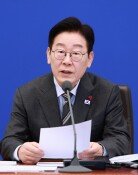Disrupters for economic development
Disrupters for economic development
Posted February. 09, 2015 08:31,
Renowned economist Choi Seung-no, deputy director of Center for Free Enterprise, published a book Disrupters for economic development, 6th printed work of Identity of Republic of Korea Series by publishing company Baeknyeondongan. The author wrote, Although Korea has achieved a remarkable economic development that many countries in a quagmire of poverty and suppression admire, it has faced not a few oppositions and interference to come to this far. It is especially recommendable to read Opposition for the sake of opposition for Gyeongbu Expressway, a tunnel in Mount. Cheonseong, Saemangeum seawall project and mad cow disease crisis.
When Gyeongbu Expressway was under construction, lawmakers from the opposition party lied down on the street to get in the way of construction, saying, Do not damage high-quality farmland, We oppose the Expressway that would be exclusively possessed by the rich. Professors at Business Administration Department of Seoul National University issued an opposition statement. Professor Byeon Hyeong-yun criticized, arguing, The expressway will be an excursion path for a few affluent people with their wives and concubines to do nationwide sightseeing. Some even cursed, Former President Park Chung-hee would fail with Gyeongbu Expressway project as Heungseon Daewongun did while he was pushing forward with building Gyeongbok Palace.
How can you balance a budget in iron and steel industry?, Even though we build an iron and steel company, there wouldnt be enough fuel to run the factory and its final products would be useless. These were criticism made when POSCO (formerly Pohang Iron and Steel Company) was under construction. Some insisted on importing iron and steel and growing rice. It would be hard to talk about the success story of Korea without mentioning Gyeongbu Expressway, main artery for distribution, and POSCO. I highly recognize the decision for the countrys industrialization made by national leaders and fight for democracy by opposition parties. When we focus on national initiatives for our economy, however, the opposition made by naysayers in each stratum of society was a short-sighted perspective.
Disrupters for economic development are still lucking everywhere in this society. They are the extreme far left or those who contend to benchmark the failed economic model of South America or Greece while purporting justice, equality and progress. So are political circles who claim corporate tax increase that would decrease job opportunities and cause more companies to move overseas. The late President Park Chung-hee pulled off a miracle of industrialization even though there were vehement oppositions. It seems that President Park Geun-hye falls short of his fathers insight and initiatives while she is more of a populist president. It is a weak leadership the lurking economic disrupters can easily prey on.





![“한동훈, 정치생명 걸고 무소속 출마해 평가받는 것 고려할만”[정치를 부탁해]](https://dimg.donga.com/c/138/175/90/1/wps/NEWS/IMAGE/2026/01/19/133186982.1.jpg)

